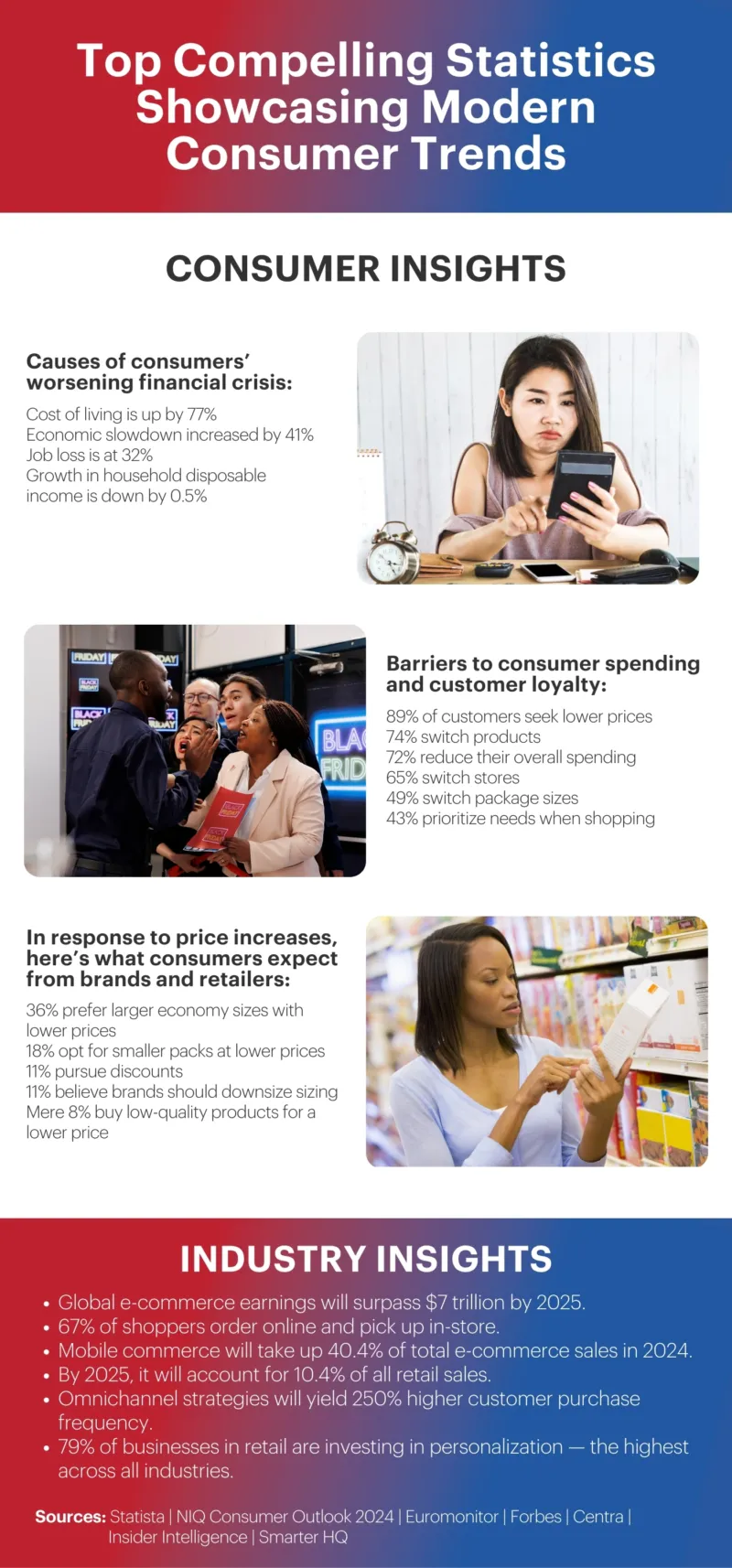
We’ve curated this infographic, which delves into various consumer trends, to help you navigate the evolving preferences of modern consumers.
Today’s consumers are a fascinating paradox.
For instance, while the economy battles inflation, some demographics still prioritize fleeting and costly experiential purchases such as vacations and concerts. While consumers prefer established brands where quality and value are guaranteed, they are willing to support niche brands that offer more sustainable alternatives.
In an age of information overload and constant connectivity, consumers are inundated with choices, making it challenging for businesses to capture their attention and loyalty. However, despite the complexities and contradictions inherent in consumer behavior, companies must adapt and innovate to meet their evolving needs and expectations.


Global Consumer Trends: What Customer Service Should Be Like in 2024
Adapting to the New Normal
The COVID-19 pandemic catalyzed a dramatic shift in global consumer behavior, unveiling vulnerabilities in global supply chains and triggering waves of panic buying. As shelves once laden with goods stood barren, consumers grappled with shortages of essential items, prompting a reevaluation of consumption habits.
A new equilibrium emerged in the chaos: The surge in online shopping. Fueled by mobile banking and delivery infrastructure advancements, this redefined the pandemic era.
The Ripple Effect of Economic Uncertainty
As inflationary pressures loom large in the post-pandemic era, consumers confront the stark reality of rising living costs. In response, they exercise more discretion in purchasing decisions, prioritizing affordability and value. From rental models to higher quality but more affordable products and services, consumers want to maximize economic value while maintaining lower prices.
Woke Consumerism in the Modern Era
In today’s consumer trends, people’s preferences shift away from the allure of cheap and fast products as environmental concerns drive demand for ethically sourced alternatives. With the rise of ethical consumerism towards conscious consumption, consumers wield their purchasing power to effect positive social and environmental change.
The Digital Evolution
In a digital landscape characterized by exponential growth, online shopping is a force to be reckoned with. As businesses pivot to meet the changing needs of consumers, the convergence of technology and commerce heralds a new era of convenience and sustainability.
The GenAI Dilemma
The advent of generative AI (GenAI) casts a shadow of uncertainty over consumer behavior, eliciting wariness and anticipation. While consumers recognize the potential benefits of GenAI, concerns linger about its societal implications and the proliferation of low-grade content. The future of consumer behavior hinges on the delicate balance between human creativity and technological innovation.
Personalized Customer Service
In 2023, the demand for personalized customer service reached significant heights, with three-quarters of customers expressing their expectations for tailored experiences.
The growing expectation for personalized service reflects consumers’ desire for more meaningful and relevant brand engagements. They appreciate when companies go the extra mile to understand their specific requirements and provide solutions that cater to their preferences.
What This Means for Customer Service in 2024
As consumer behavior undergoes a profound transformation this year, let’s explore the crucial implications of consumer trends on customer service practices and outline critical strategies for businesses to adapt and thrive in this evolving environment.
Personalization
One of the defining characteristics of customer service in 2024 is the emphasis on personalization. With consumers becoming increasingly discerning and selective, businesses must tailor their interactions to meet individual needs and preferences.
Companies can gather insights into customer behavior and deliver personalized experiences across various touchpoints by leveraging data analytics and AI-driven technologies. Whether through customized recommendations or proactive outreach, personalization fosters more profound connections with customers and enhances overall satisfaction.
Omnichannel Support
With consumers increasingly interacting with brands through multiple channels such as social media, email, phone, and live chat, providing seamless and integrated support across these channels has become paramount.
Consumers expect a consistent and unified experience across all touchpoints. They want to seamlessly transition between channels without repeating themselves or providing redundant information.
Proactivity
Proactive problem-solving also emerges as a critical focus area for customer service. In the fast-paced, digital-first landscape, anticipating and addressing customer issues before they escalate is essential for maintaining customer satisfaction and loyalty.
Humanity
With global socio-economic challenges, empathetic touch points are more crucial than ever. Customers seek support from the brands they engage with, and businesses that demonstrate this in their customer service practices are more inclined to drive loyalty and satisfaction.
Sustainability
Consumers now favor sustainable products that prioritize environmental stewardship and social responsibility. As such, businesses must integrate sustainability principles into their customer service through initiatives such as eco-friendly packaging or community engagement efforts.
Aligning customers’ values and demonstrating a commitment to sustainability will empower companies to differentiate themselves in the marketplace and appeal to a growing segment of environmentally conscious consumers.
Keeping Pace With Evolving Consumer Trends By Outsourcing
Outsourcing services play a pivotal role in enhancing customer service and meeting the evolving needs of consumers in 2024. Businesses can tap into a pool of skilled professionals to provide outsourced customer support, technical support, and other essential services.
Call center services enable businesses to streamline their processes, saving money and resources in the long run. A contact center also empowers businesses to reduce overhead costs associated with maintaining in-house teams while still meeting consumer demands for prompt and efficient support.
Why the Philippines?
Outsourcing to the Philippines, known for its skilled workforce and proficiency in English, offers a strategic advantage for businesses looking to provide high-quality customer service to a global audience. Outsourced customer service representatives in the country efficiently handle customer inquiries, resolve issues, and provide assistance across all channels, whether offline or online.
With a strong focus on training and development, Philippines customer service outsourcing delivers exceptional support tailored to diverse consumer segments’ unique preferences and expectations.
Stay Ahead of Evolving Consumer Trends With SuperStaff
With consumer preferences shifting rapidly and new technologies reshaping how we engage with products and services, companies must adapt swiftly to meet the demands of the modern market.
SuperStaff, your trusted customer service partner, can help you do just that. Our dedicated team provides unparalleled support and expertise to help you anticipate, understand, and respond to the evolving needs of your target audience.
Our approach is simple yet effective: Combining cutting-edge technology with human-centric solutions to deliver exceptional customer experiences. Whether providing personalized support, leveraging data analytics to uncover insights, or implementing innovative strategies to enhance customer engagement, SuperStaff is committed to helping you stay ahead of the curve.





